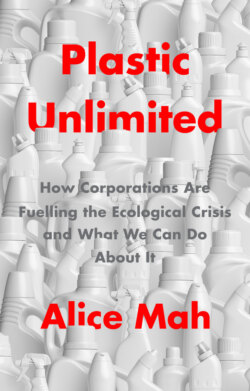Читать книгу Plastic Unlimited - Alice Mah - Страница 10
Unlimited Plastics
ОглавлениеThe European plastics industry celebrated ‘100 Years of Plastics’ in December 2020 with the launch of a website about how plastics make life better and more sustainable. The tagline: ‘Unlimited Possibilities for the Future’.50 The hallmark achievement in 1920 was the publication of a ground-breaking research article by the German scientist and Nobel Prize winner Hermann Staudinger, which formed the basis for modern polymer science. A collaboration between the Macromolecular Chemistry Division of the Association of German Chemists and Plastics Europe Deutschland (the German branch of the Plastics Europe industry association), the website features monthly articles that showcase ways that plastics help society. The first article, ‘Plastics During the Pandemic’, singles out five plastics applications as making material contributions to COVID-19: protective clothing; plastics machinery (for making masks and other equipment); protective walls (transparent partition walls); medical sector materials; and the transport of vaccines (in insulated frozen boxes).51 Notably absent from this list are plastic bags and disposable food and beverage containers, which the industry had so actively promoted as the ‘sanitary choice’ at the beginning of the pandemic.52 Despite its centennial theme, the ‘100 Years of Plastic’ website avoids any mention of the wartime origins of modern plastics. Instead of reflecting on the past, it speculates on the future, using the occasion to capture the celebratory mood of the plastics revival of the pandemic. The unlimited possibilities for the future of plastics, naturally, are all about perpetual growth.
The capitalist pursuit of unlimited growth is the key problem underlying the plastics crisis. It is not unique to the plastics industry, but rather the defining feature of all corporations within modern capitalism. Publicly traded corporations are legally obliged to act in the ‘best interests’ of shareholders, which most people interpret to mean maximizing profits and growth. However, as anti-trust lawyer Michelle Meagher argues, the powerful norm of shareholder value exists only weakly in law and is unenforceable. In other words, according to Meagher: ‘Shareholder value is not the law – or it does not have to be, if we collectively agree that it is not.’53 Meagher notes that when corporations were first created in England in the seventeenth century to fund public projects, ‘the norm of accountability was not limited liability but actually unlimited liability’, as their principal obligation was to fulfil their public purpose. Of course, Meagher reminds us, the ‘public’ purpose that these early corporations served was tied to the colonial ambitions of the British Empire, but her point is that the norms governing corporations can change. The limited liability of the modern corporation, in her view, ‘removes responsibility and accountability’.54
Recently, business leaders have attempted to cast the corporation’s shareholder purpose in a new light. In April 2019, the Business Roundtable of more than 200 of the world’s top CEOs proclaimed that the new purpose of publicly traded corporations would be to serve the interests not only of shareholders but also of workers, communities, and the environment.55 This exemplifies what law professor Joel Bakan describes as the ‘new’ corporation of the twenty-first century: ‘doing well by doing good’, or ‘making money through social and environmental values rather than in spite of them’.56 The problem, Bakan argues, is that the legal structure of corporations – enforced by the profit-seeking imperative of capitalism – requires that they will always prioritize doing well over doing good. Furthermore, as the political scientist Peter Dauvergne observes, the business case for corporate sustainability is not just about deflecting criticism; it is also about gaining corporate power over regulations.57
